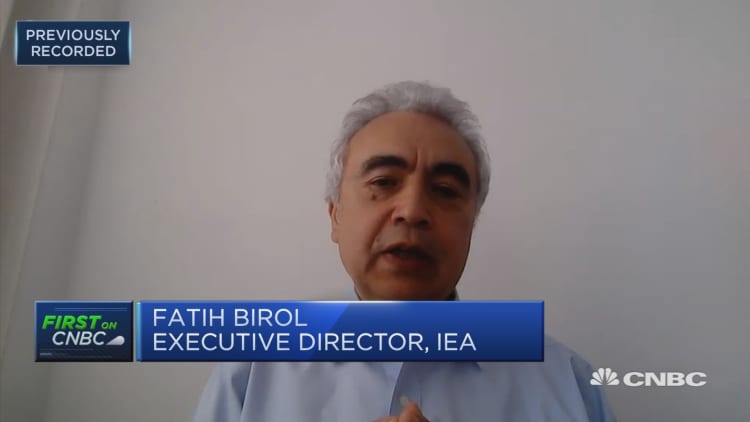
Some of the world's largest oil producers will meet to discuss a historic production cut later this week, with energy analysts split over the prospect of non-allied partners, including the U.S., signing up to a deal immediately thereafter.
An emergency meeting of OPEC and non-OPEC partners, sometimes referred to as OPEC+, will be held on Thursday, as the coronavirus pandemic continues to ravage global oil demand.
OPEC kingpin Saudi Arabia and non-OPEC leader Russia are seen as likely to agree to cut production in an effort to arrest an oversupplied market, but only on the condition that the U.S. joins a global pact, Reuters reported, citing unnamed sources.
President Donald Trump said Monday that OPEC hadn't asked "that question" yet, but suggested U.S. oil production had already fallen anyway.
Crucially, G-20 energy ministers will convene for their own extraordinary meeting one day after OPEC+ producers sit down for talks.
International benchmark Brent crude traded at $33.87 a barrel Tuesday morning, up around 2.5%, while U.S. West Texas Intermediate (WTI) stood at $27.04, more than 3.7% higher.
Brent fell over 3% in the previous session, with WTI down more than 7% amid fading hopes of an unprecedented supply cut. Both benchmarks have fallen more than 50% from their January peak.
Fatih Birol, executive director of the International Energy Agency, told CNBC's "Street Signs" on Tuesday that he welcomed the prospect of G-20 oil producers meeting on Friday.
The G-20 meeting is "very important" for two reasons, Birol said. "One, even if this Saudi-Russia agreement would take place, and people talk about the 10 million barrels per day production cut, this will not be enough to address the big problem we are facing."
The IEA chief warned that the energy agency expected stocks to build by about 15 million barrels per day this quarter, so a deal might put an "upbeat mood in the markets for a couple of days (or) couple of weeks, but people will realize there is still a huge amount of oil in the market."
"The second (reason) … I think the world needs a global political response," Birol said, before urging all of the world's oil producers to make a "positive contribution" this week.
Saudi Arabia could let weaker competitors 'wither'
The coronavirus pandemic has meant countries around the world have effectively had to shut down, with many governments imposing draconian measures on the daily lives of billions of people.
The restrictions have created an unprecedented demand shock in energy markets, just as a price war broke out between powerhouse producers Saudi Arabia and Russia.
Bjarne Schieldrop, chief commodities analyst at SEB, told CNBC via email that he was not optimistic about a deal to cut production this week, and even if there was one, "it won't necessarily help all that much."
Saudi Arabia will most likely look to keep production running between 12 million barrels per day and 13 million barrels per day, Schieldrop said, "letting weaker competitors wither or die" in the current market trough.
But, if there is a deal, a widely-based agreement involving both OPEC and G-20 members would probably cut roughly 10 million barrels per day when compared to first-quarter 2020 production levels.
"That will still leave the oil market with a very substantial production surplus, and even that will be of a magnitude the oil market has hardly ever seen before," Schieldrop said.
'Long list' of possible complications
Energy analysts at Eurasia Group said some form of output cut was likely, despite a "long list" of possible complications that could still lead to a breakdown in talks.
"The most significant obstacle to an OPEC++ deal remains around U.S. policy and lack of clarity over Trump's priorities … One of the key issues is reconciling Trump's longstanding rejection of OPEC with his desire to stabilize the US oil industry."
"The G-20 forum could provide space for a looser arrangement where explicit U.S. cuts are not necessarily required and market-led decreases in U.S. production can potentially be repackaged as a U.S. contribution," Eurasia Group said.


